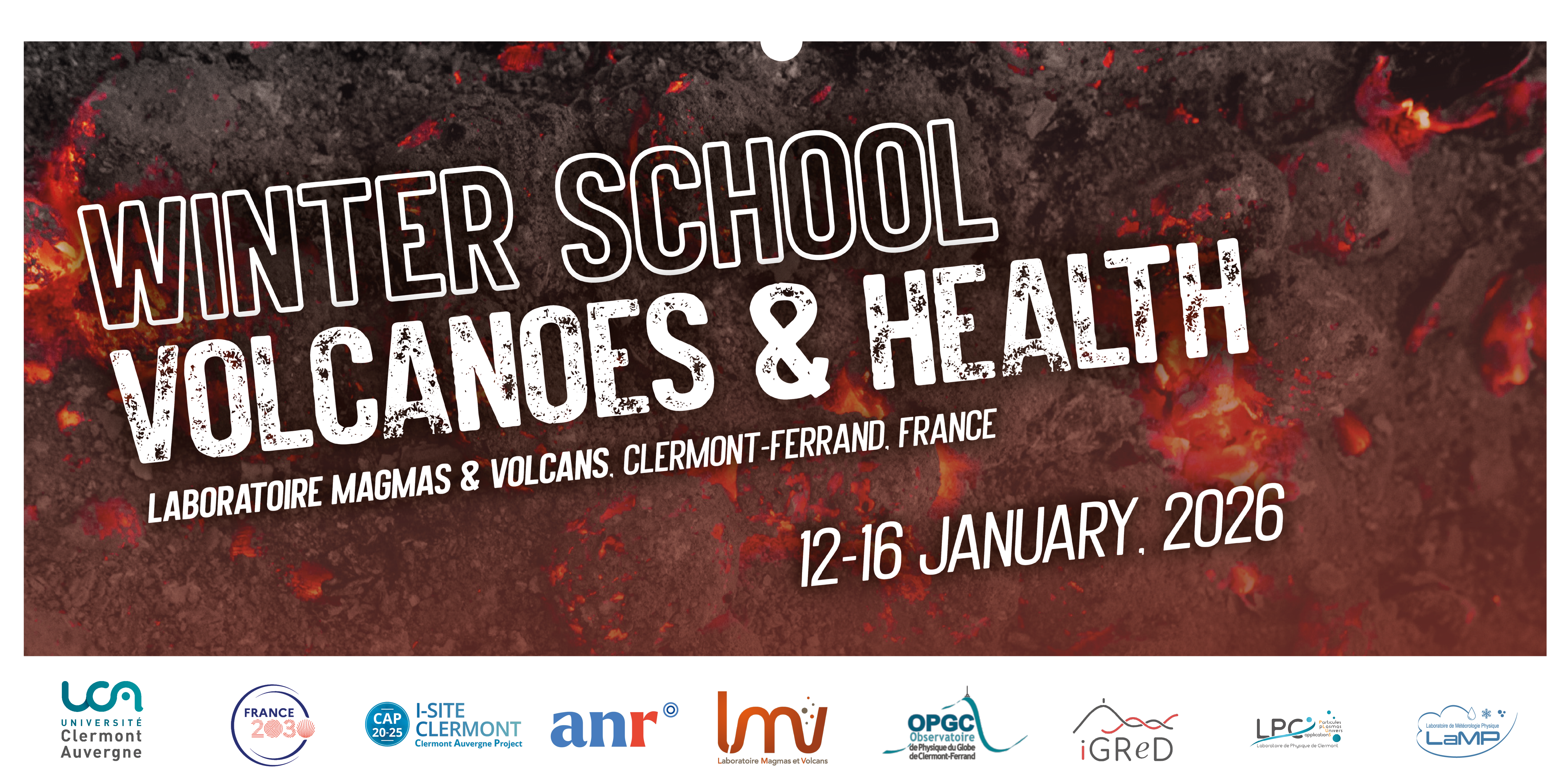Registration : Winter School Volcanoes & Health

From January 12 to 16, 2026, the LMV invites you to attend its Winter School “Volcanoes & Health,” which will examine the health impacts of volcanic emissions through an interdisciplinary approach. Find out more about the program and register before September 14, 2025. !
This winter school is addressed to Master’s and PhD students and PostDoc researchers who would like to learn about interdisciplinary research on the health hazards of volcanic emissions. The proposed lectures and practicals will be at the interface between : volcanology, geochemistry, petrology, atmospheric sciences, biology, health sciences and social sciences.
The school aims to provide a theoretical and practical understanding of the evaluation of the health hazards in volcanic contexts. We will cover aspects of observation, measurement, analysis and modelling of volcanic phenomena and products, as well as the assessment of health impacts at the population scale.
Registration
Interested by joining our experience ?Students are invited to apply by submitting :
• A motivation letter and a CV
by the 14th of September 2025 at winter-school.lmv@uca.fr
A limited number of grants (covering transport and accommodation) will be provided to students who request it.
- Speakers
-
• Laboratoire Magmas et Volcans + institut de Génétique Reproduction et Développement: Julia Eychenne, Ines Tomasek, Lucie Sauzéat
• Laboratoire Magmas et Volcans: Séverine Moune, Pierre-Jean Gauthier, David Jessop, Simon Falvard, Federica Schiavi, Raphaël Paris, Lucia Gurioli
• Institut de Génétique Reproduction et Développement: Vincent Sapin, Loic Blanchon, David Volles, Claude Beaudoin
• Laboratoire de Physique de Clermont Auvergne: Luca Terray
• Laboratoire de Météorologie Physique: Agnès Borbon
• UMR SOURCE: Guillaume Dezecache
• USGS: David Damby - Pratical details
-
- The school will be entirely taught in English.
- Maximum attendance: 15 people.
- All the lunches as well as one dinner will be provided.
- No registration fee.
- Discover the full program
-
Monday 12 January: Introduction to the health hazards from volcanic eruptions and population-based studies
Morning : 3h of lectures- Presentation of the speakers.
- General introduction on the health effects of volcanic activity.
- Human health in volcanic environments: lessons from epidemiological studies.
- Psychology of disasters and human behaviour in front of health risks: socio-psychological studies in volcanic environments.
Afternoon : 3h of practicals
- Presentation of the participants (live survey and/or games).
- Practicals on existing epidemiological and socio-psychological data.
- Choice of epidemiological approaches. Introduction to psychosocial concepts and behavioural science. Statistical data processing with R. Critical analyses of the results.
Tuesday 13 January: Gas emissions
Morning: 3h of lectures- Radioactivity of volcanic emissions and associated health effects.
- Characterization of gas emissions (ground and plumes) and associated health effects.
- In vitro approaches for the evaluation of the biological reactivity of gases.
Afternoon: 3h of practicals
- Demonstration of various gas sampling and measurement techniques (Popcorn, multigas, accumulation chamber) in the field in Chaîne des Puys if the weather conditions allow it.
Wednesday 14 January: Visit of the Lemptégy volcano and health response crisis management exercise
Morning: Visit of Lemptegy volcano
Meal at Lemptegy
Afternoon: Health response crisis management exercise.
Thursday 15 January: Particle emissions and biological reactivity
Morning: 3h of lectures- Physicochemical characterisation of particle emissions.
- In-vivo and isotope metallomics approach for understanding the impact of volcanic products on biological systems.
- Pathophysiology of lung aggression.
Afternoon : 3h of practicals
- The possible practicals: (1) SEM analyses at the grain scale of volcanic emissions, (2) preparation for isotopic analyses applied to biological samples by MC-ICP-MS, (3) mineralogical analysis by Raman spectroscopy, (4) ash leaching, (5) isolation of respirable ash samples by aerodynamic separation.
Friday 16 January: Exposure to volcanic emissions
Morning: 3 h of lectures- Analyses of volcanic deposits for the characterisation of particle dispersion in volcanic emissions.
- Air quality in volcanic environments.
- Numerical modelling for gas dispersion assessments.
Afternoon: 3h of lectures
- Development of a human exposure index to volcanic emissions using GIS methods.
- Numerical modelling using a case study example (e.g., La Palma, Soufrière Guadeloupe)
- Time series analyses of air quality and comparison to volcanological data using a case study example.
